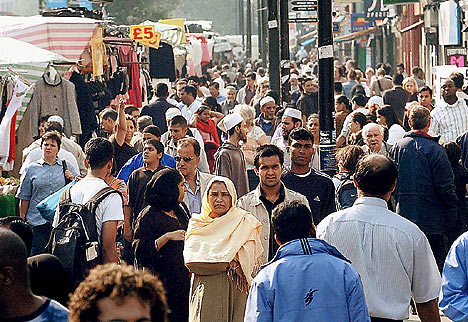David Cameron has given a speech on welfare and immigration, and as always when a Tory talks tough on the subject, it has been panned by the commentariat of Left and Right.
That’s because this is a subject that cuts across the political divides. Various opinion polls attest that the real division over migration is between social classes, with the London media set the most in favour.
In David Goodhart’s new book The British Dream he argues that “Hampstead liberals” like himself got it wrong over immigration and chose universalism (looking after the whole world) over looking after their fellow citizens.
I’ve also got a book out (I might have mentioned it once or twice), and in it I argue that the Right is also responsible, too willing to see mass immigration as an economic benefit while ignoring the social costs.
The pro-globalisation Conservative view of immigration tends to be that:
a. If we have free markets we must have free movements of people.
b. Fears about jobs are based on the lump-of-labour fallacy.
c. If we’re short of houses, we should build more houses (besides which immigrants account for a small proportion of social housing).
d. In order to grow, the economy requires more immigrants.
Although many Liberal Democrats and a small number of Labour politicos hold this opinion, I would argue that it’s an economically liberal, Right-wing view.
Look at it this way: imagine that Britain had had mass immigration from the 1860s onwards. How do you think the rights of British workers would have panned out over the late 19th and early 20th century Would housing conditions have universally improved as far as they did Would inequality have declined Would a workers’ party have ultimately come to power Would trades unions have become so powerful and popular Would we have got a welfare state and NHS Extremely unlikely, any of these scenarios, because immigration and diversity weakens worker power, something acknowledged since ancient times, when slaves from the same tribe were kept apart on latifundia.
It’s been too easy for Conservatives to see immigrants simply as good workers at reasonable prices, without looking at the short-term economic or long-term social costs.
Regarding to wages, most of the commentariat are not threatened by immigration, because to become a columnist or radio presenter requires culturally specific skills that immigrants do not posses. But in many industries the availability of cheap immigrant labour has kept wages down.
Likewise, many Conservatives feel that if we have free trade we should have free movement of people. Why, exactly Japan’s foreign trade is worth $1,678 billion a year, and they manage to do without much immigration. Britain’s trade expanded exponentially in the 19th century without much internal movement. Out of principle The reason it’s okay to move around goods but not people is because once we’re finished with goods we can chuck them out; we can’t do the same with people, who marry and have children and have rights and agency and humanity.
One of the arguments I often hear is that, although immigration over the last 15 years has been wonderful and smashing and everything, what we didn’t do is prepare for the expansion by building the houses. And yet the people expressing this view tend to live in upmarket parts of London, exactly the areas that will not be troubled. Few people want more housing on their back door; almost no one wants social housing. You can’t just say, “hey presto, build!”
And immigration has played a part in the housing shortage. Currently one in ten new social housing lets nationwide are to foreign nationals, according to MigrationWatch, and the English Housing Survey estimates that around 20 per cent of all social housing stock in London is occupied by foreign nationals. MigratonWatch has tried to find out from London councils what proportion of their tenants are foreign-born, but most won’t reveal the statistics, although MW estimate it may be up to half in some boroughs. It doesn’t matter that most people come here to work hard – of course they do. But any welfare state must put the needs of nationals first.
These things may not matter for the commentariat, but if you can’t find a home in your hometown and you see properties going to people from other countries, you’d feel a bit angry about it, surely And it’s not just numbers; various studies have found that, the more ethnically fragmented a society becomes, the less willing people are to pay for social housing. So it’s not just a matter of building more units; if people don’t feel a sense of solidarity, those struggling will struggle more.
Finally, we have the argument that the economy will only continue to grow if we import more people. I can see one small problem with this idea. Like all Ponzi schemes, it has to end at some point. The closest parallel is that other Thatcherite yellow brick road, the housing market; last week Chancellor George Osborne signalled his cunning plan to revive our fortunes by re-inflating the housing bubble and so make housing ever more unaffordable for millions of people.
Many Conservatives have put their faith in a low-wage, high-churn economy based on the twin get-the-rich-richer-quick-schemes of mass immigration and property inflation. Both of these policies continue to lead to ever expanding inequality levels, static or even declining spending power towards the bottom of society, and shifting sands for those struggling in the middle. Personally, that’s not a society I feel very comfortable living in.
